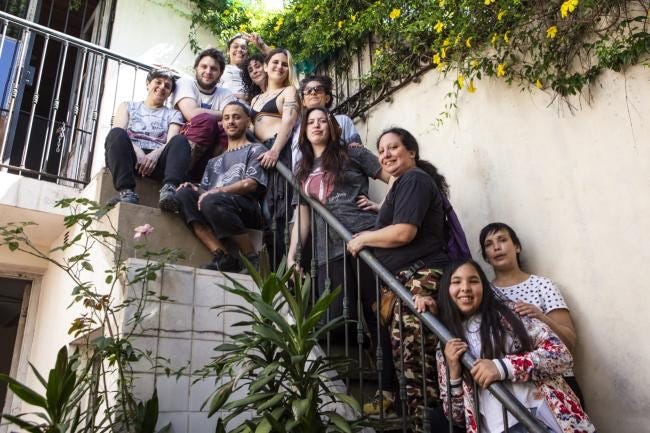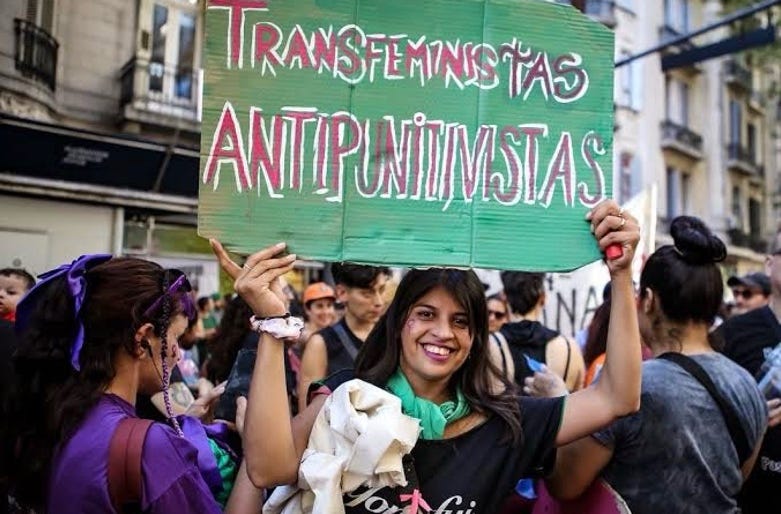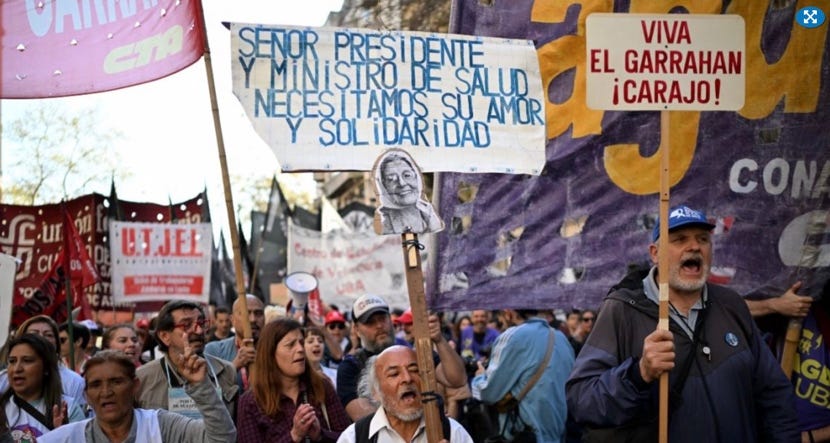What Works to Stop a Dictator? In Argentina, decentralization, debate, and learning to listen are needed steps to revisioning democracy (Pt 2 of 2)
A spotlight on the transfeminist activist group Columna Mostri and its goal: “to reconsider how we want to live”. It's also modeling a great way to confront cancel culture.
This article is Part Two of a two-part article and has been updated to reflect with the results of Argentina’s Oct. 26 national legislative elections. See Part One here. It’s also part of a series of field reports from Argentina and other countries examining the lessons and ingredients of effective resistance to autocracy. See earlier reports here.
Columna Mostri members taking to the streets of Buenos Aires
Photo: Columna Mostri
Part Two of a 2-part article:
Modeling a community-caring approach — and confronting ‘punitivism’
It’s not surprising to find that many Mostris reject neoliberalism and unbridled capitalism as examples of economic approaches that contribute to structural inequality. It’s what they don’t want. One slogan that’s emerged is their fight against punitivismo, or punishment, which is how activists sum up Milei’s policies. They oppose his creation of a surveillance and police state using social media and AI agents. The punitivism movement borrows from the modern abolitionist movement, which aims to transform the penal system and advance alternative models of justice. Abolitionism is viewed as both a practical organizing tool and a long-term goal. In the US, Angela Davis and Ruth Wilson Gilmore are among leading Black feminist abolitionists.
In Argentina, YoNoFui (‘It was not me’) is a prison abolitionist collective that joined Columna Mostri. It first emerged from a poetry workshop in the Ezeiza prison in suburban Buenos Aires over twenty years ago. Its members have developed a collective, community-centered, caring approach to facilitated discussion of thorny topics, one that examines intersecting systems and institutions that may lead to marginalization, prison, or other punitive responses by the state. YoNoFui developed a school and training courses based on transfeminist principles and has helped facilitate and train Mostris in the art and skill of listening to navigate difficult conversations.
Members of YoNoFui’s pro-abolition collective have shared their approach to intersectional, community-centered discussions, and active listening and helped facilitate at Columna Mostri debates.
Photo: YoNoFui
“Punitivism is a pedagogical tool of capital,” states a YoNoFui social media meme calling for a fight against it. “It’s a way of living, of organizing and connecting ideas. It provokes distrust and points to others as a potential threat. It is something that shapes our ways of relating in a repressive and controlling culture, based on surveillance models.” The Mostris have denounced Milei’s adoption of facial recognition technologies and other AI tools being used by his intelligence services to surveil and attack critics, including pro-democracy protesters and journalists.
Photo: YoNoFui
From disagreement to decentralized action
The Mostris aren’t just about words, either and Dillon and others stress that. The goal is to move from discussion to informed action, but they want to avoid past mistakes. That means dispensing with the idea they need to achieve overnight unity to advance, or to adopt platforms when there isn’t consensus. They want to learn from the points of disagreement, which may reflect what hasn’t been worked out. The goal is to open up debate, not shut it down. You have to understand a problem to advance a solution; usually, solutions lie within problems, too.
By opting for decentralization, and stressing intersectionalism, they seek to identify a “table” of issues that invite action. But don’t want to demand that everyone tackles issues the same way. In reality, there’s often a lot of agreement, and common agendas for action emerge from the asambleas. The invitation to listen and debate has fostered organic coalition-building and new alliances, and to discuss how to integrate a given analysis into policy. As Dillon put it, “we have to find new ways of organizing. It starts by hearing each other. We have to build the trust.” That’s especially important since Milei’s government is working to divide communities, and, for example, cast trans identity or the demand for health care as a threat to Argentine parents and families.
Photo: Columna Mostri
Calling out Trump’s bailout colonialism
The Mostris are also debating right-wing alliances and the role of outside groups. They view Milei’s policy as unfettered capitalism that enriches an elite at the expense of Argentina’s majority including rural and indigenous residents. Milei has actively wooed US and foreign investors to help stabilize Argentina’s currency, while touting its supply of critical resources of industrial metals including lithium and copper sought by the tech industry.
That’s part of what’s behind the recent US $40 billion bailout of Argentina by Trump’s Treasury Secretary Scott Bessent, which was reportedly done to help his longtime friend Dan Citrone, owner of the Pittsburgh Steelers, who heavily invested in Argentina when Milei won. A recent New York Times story noted that, along with Citrone, investors at BlackRock, Fidelity, and Pimco and Stanley Druckenmiller also heavily invested in the Argentine markets. They’ll also benefit from the US bailout.
For the Mostris, the issue is one of an anti-democratic foreign interference in Argentina’s politics that directly impacts on their lives, and raises the challenge of engaging in progressive solidarity with US and other pro-democracy activists. Trump is engaging in regime change actions and policies not only there, but in Venezuela, and in Brazil, where Trump continues to try prop up former autocrat Jair Bolsonaro who was recently sentenced to 27 years in jail for a failed, violent, 2022 coup attempt after he lost the presidential election to current president Lula da Silva — a coup plot similar to the Trump-MAGA January 6 Capitol insurrection.
.
Ni Una Menos marchers rally being a green scarf to denounce femicide, International Women’s Day.
Photo: Ni Una Menos
The monster rally cry: “Life is at risk”
The Mostris adopted a slogan and public call to unite, claiming “life is at risk” under Milei, a call that invites all Argentines who feel imperiled by his policies to march with Columna Mostri. During the 2024 women’s rally, labeled “8M” that was attended by tens of thousands of Argentines, journalist Liliana Daunes read a women’s march document calling for an end to hunger and the repeal of Milei’s austerity policies titled, We were a Tide, We Will Be a Tsunami. It listed the myriad ways Milei’s government was “destroying the rights of the working class and the people” and made clear the feminist response to this threat. Read Daunces: “We are the ones who protest and take matters into our own hands, because we will sustain life at all costs when it is at risk.”
Throughout 2024, as Columna Mostri debates and street protests drew more participants, its members also joined other anti-Milei marches, including a major strike in the fall by employees at the Garrahan Children’s Hospital in the capital, the largest pediatric hospital in Argentina, heavily impacted by Milei’s budget cuts. So did university students and pensioners who supported hospital workers and patient families, underscoring how more sectors of the public are feeling the negative impact of the austerity measures. They’ve also joined labor and climate change protests, broadening the pro-democracy opposition to Milei.
The Davos Wake-Up Call
On January 23, 2025, Milei went on a fresh rampage in a speech at the World Economic Forum meeting at Davos, denouncing trans individuals and comparing gay male couples with children to pedophiles (See my prior Argentina reporting on this here). The Mostris called on other sectors to urgently gather and discuss a unified response. Attendance at Columna Mostri asambleas spiked, and 5000 people joined open-air meetings in a local plaza for debates that sometimes lasted four hours. The same groups who turned up to protest at the pediatric hospital and climate change and Gaza protests showed up. On February 14th, the Mostris helped lead a LGBTQIA+ rights march that morphed into a massive pro-democracy nationwide action. A month later, the expanded Mostri column joined the 2025 International Women’s Day March, and later, a national labor march.
By this point, Peronist labor and other anti-Milei groups are hosting weekly protests in Buenos Aires. The Mostris join those, too. For them, it’s as important to turn up for the actions organized by other groups and sectors while inviting them to expand the big tent of who identifies and organizes as a transfeminist.
Mostri transbaron activist Ese Montenegro, (L) with the author (R).
Photo: AC d’Adesky
Transforming the Queer Agenda
Ese Montenegro is a longtime trans activist who identifies as transbaron, or transmasculine. To him, Milei’s libertarian agenda puts a critical spotlight on class and economic issues that the LGBTQAI+ movement has failed to adequately address. “It’s a challenge to queers,” he said about class issues. “We need to transform the queer agenda, and human rights in Argentina, so every person understands why defending the poorest – or someone trans – is part of the embrace of democracy.”
Montenegro, 44, has been an activist since the 90s and lives in Buenos Aires. He was raised in a working-class family; his father was a Peronist union organizer. He studied psychology and history and is currently pursuing a law degree, while working at the National Congress in the training department of the Chamber of Deputies. He began his own activism in the student movement, then in the labor movement, including twelve years working in a factory. His experiences there and as a union organizer led him to feminism, he says. Before coming out as trans, he identified as a lesbian.
“Since I was very young, I thought that it is politics that changes the living conditions of people, so in one way or another, through different channels, I was always more connected to that,” he said, explaining his priority focus on the economic conditions of people’s lives. While Milei is going after LGBTQIA+ people, not all are impacted the same way, he noted. He cited his own circumstances as an example. He is trans, but benefited from higher education, and has had access to health services to transition. He works in a sector of the government not heavily impacted by Milei’s budget cuts – so far. So he has more job and social protections than many Argentines. “I personally look at the context and say, ‘well, I have a job, I can study, public universities still exist... it’s hard for me to make ends meet, but I make ends meet.’ But there are also many people who are losing their jobs and who are in a worse situation of marginalization.”
In his view, the LGBTQIA+ movement in Argentina has overly reflected the concerns and priorities of middle-class Argentines, not those living in poverty or without access to formal work. “I believe that for a long time, at least, LGBT activism was very niche and it was difficult for us in some way to popularize the discussion” of queer rights, he explained, citing the national focus on same-sex marriage as an example. “I think that when there was a discussion about legal marriage here it was because there were sectors of the LGBT movement that are middle class that reached those places of discussion, when [it was about] the integration into a good life, without realizing that the majority of people were living in poverty as such. I am completely in favor of voluntary marriage, but I say, ‘well, who gets married? Who inherits? Those who have something.’ I mean within that LGBT movement, and apart from us, there are those who do not have a house, family, or inheritance. So that was a reflection of an upper-class movement or the middle class. That is what this is about: class.”
Now, with Milei going after all but the elite, he says, “we began to encounter those other bodies that are always missing, that are the most precarious.” While that may include trans bodies, it also includes women’s bodies, and elderly bodies, and those with HIV, and sex workers, and rural indigenous people displaced by Big Oil multinationals, and kids at Garrahan hospital -- all representative of different Argentines impacted by Milei’s economic policies and cuts in state funding. What excites him about the Columna Mostri asambleas and the millions who showed up to march for trans rights under the pro-democracy banner in February is the growing recognition of how Milei’s policies are collectively hurting them and what unites them across differences of identity.
At the asambleas, he said, “Well, of course we were the trans people saying, ‘hey, it’s also very good to defend our rights, [but] we also have to take charge of the fact that retirees are being killed and intersect those discussions. Because at some point we are going to become old, with luck. With luck, we will get old if they don’t kill us before then,’” he joked. “So, well, how to generate a network there?” The issues of elder care, or cuts to pediatric services at the public hospital, are issues for the queer movement, as is abortion. They center on the rights of citizens and the responsibilities of the state in areas health care and bodily autonomy. Rather than framing the trans debate around gender per se, he advocates more focus on social conditions, and human rights issues, which include economic rights.
From Words to Action
It doesn’t end there, though. The asambleas are a starter point of discussion. From them, Mostris bring the viewpoints back to their organizations, and their unions, and their political parties, and integrate them into their action plans and policies. That is the intersectional seeding that is yielding more of a vision of what they want, which is to incorporate human rights principles into their vision of a more responsive democracy. It’s also about sharing their ideas and demands for action with political candidates who claim to represent them. Over the past months, more political party leaders have also showed up at Columna Mostri meetings and marches.
For Montenegro, the debate has been critical and rich, even if it can be hard and frustrating. Among the hard parts, he said, is the fact that members of Peronist political parties including politicians who’ve joined the discussions, aren’t used to decentralization. The traditional left parties are quite hierarchical, he explained. They often want others to take up hard-left party doctrine positions, while other activists, including trans members, may work outside such political structures, or may identify as anarchists, or simply share different political analyses of issues. By inviting respectful discussion, but not demanding agreement on issues, the Mostris can avoid getting stuck.
What matters is the process of debate, in which active listening is the greatest demand made on all participants. “When you hold an open Assembly, you’re not necessarily going to build a long-term political platform,” Montenegro explained. Some meetings are called for urgent crises, like the big open area ones; others are to reflect on issues, which small working groups do. But everyone can participate; no one controls the mic, and everyone must listen.
Hospital workers joined by patients, students, pensioners, labor activists – and Mostris, at the Garrahan hospital strike against Milei’s budget cuts to hospital services.
Photo: Columna Mostri
An evolving political maturity
“I think this is a process that is slow,” Montenegro said of Columna Mostris’ horizontal, intersectional approach to organizing. “There are people who say that this is good in the sense that it needs a decentralized movement. The first thing that we agreed upon is that we are not going to write a joint document pretending that we have agreements on things which we could not discuss,” he adds. “It seems to me that there is a political maturity that we had not managed to have before. Now they are not going to think that people who are from political parties, [or] who are very different, or have very different ideas, will just go from one day to the next to work together.” The trust and bonds between groups must be built, he says, just as Dillon put it.
“We are all Mostris” goes the slogan.
“Maybe we are getting to know each other again,” he reflects. “Like, ‘you are in such party, and you are in such organization, and you come from these movements.’” The end goal, he feels, is “one must have a platform or some issues in which each can organize on their own.” As a union guy, he seeks to transform ideas that are debated into concrete changes of policy and law, to see proposals get integrated into the labor movement’s platform and that of Peronist parties. He’s also happy to see more established political leaders turning up at Columna Mostri asambleas, which is happening in his view, “because they know all the hot action is happening there.”
He smiles as he says this. His comments remind me of ACT UP and Queer Nation and Women’s Action Coalition meetings across the US in the 90s, which were similarly scenes of furious feminist and queer debate that led to effective direct action in the streets.
Voting for a return to democracy
After so many months of meeting and marching, what began as a reclaiming of the outsider identity and the criminalized body has morphed into a meme: We are all Mostris. Meaning, more Argentines now embrace that identity and turning up at other public forums to discuss what democracy means for them, and demanding accountability from politicians and community leaders.
They’re also turning out to vote. In early September, a decisive majority of Argentines in the Buenos Aires province backed progressive legislative candidates from the Peronist Justicialist party and rejected those from Milei’s far-right party — 47% to 34%. That’s shifted the balance in Congress and spurred political pundits to predict Milei may not survive a second term. Argentina’s national mid-term legislative elections are looming this Sunday —October 26 — a major litmus test of the power of the growing opposition.
Ironically, Trump’s recent $40 billion bailout loan to Milei has partly backfired, reported Montenegro. While it somewhat stabilized the peso, and boosted outside investor confidence in Argentina’s economy, it infuriated Argentines who view it as a colonialist move, and may spur more to vote against Milei this weekend. “We are quite nationalistic in Argentina,” Montenegro observed. “People are very angry.” The bailout does gives Milei fresh cash to spread around to loyalist provincial governors to essentially buy up votes. Voter turnout for the national legislative elections is historically low, so the backlash against Trump’s interference could help the opposition. For his part, Trump publicly stated on October 14 that, “We’re not going to waste our time” if Milei’s party flops. While he hopes and thinks Milei will eke out a victory, Trump stated, “If he doesn’t win, we’re gone.”
“Pride is defending the water and the land.”
Photo: Columna Mostri
Next up: a Mostris, Locas, and Putas Pride
In November, Columna Mostri will team up with a sex workers collective to organize a political, and anti-colonialist alliance they call a Motris, Locas, y Putas Pride — Monsters, Crazies, and Whores Pride— a spunky reclaiming of the criminalized groups. They plan to march at the tail end of the Pride march and recently created an association to raise funds for this event. As in the US, the Mostris want to refocus Pride back on its earlier liberation roots, and away from the big commercial party with corporate sponsors it’s become. That’s similar to what Reclaim Pride has done in New York to create an alternative march to the big commercial one, and what organizers of Pride events elsewhere have done to refocus on the political battle at hand. The theme is Orgullo Anti-fascista y Anti-racista —Anti-facist, Anti-racist Pride. “We want Pride to be a big social protest,” explained Dillon, who fully anticipates an even greater stripe of Argentina’s public will show up than did in February.
In the meantime, the Mostris will continue making the case for in-person meetings to build connection and trust, and the value of learning to listen, and reframing disagreement as an opportunity to expand one’s understanding of issues, while borrowing from the abolitionist movement to analyze how one’s own views may even reflect internalized punitivismo, or biases about others and their experiences or differences. They want people to consider what unites us across differences, too, and to challenge hierarchies of victimization. It’s an approach that directly challenges cancel culture and opens up public conversation. It’s not easy but it’s important. All of it is about reconsidering the ideals that define feminism and LGBTQIA+ rights, while battling to reclaim and build a more responsive democracy. While the process is challenging, their decentralized approach also allows many voices and hands to steer the ship forward.
A Post-Election Addendum: Trump scores a victory in Argentina….
On October 26, Montenegro’s fears of a low voter turnout that would favor Milei were borne out. Trump’s big bailout and Milei’s fear-mongering propaganda helped secure a decisive victory for the Liberty Advances party in its national legislative elections, where they won 40.8% of the vote, versus 31.7% for the Peronist Fuerza Patria opposition party and its regional allies. It also marks the lowest voter turnout in these elections since 1983. Despite compulsory voting in Argentina, only 68% of eligible voters did so, suggesting that many remain unhappy with Milei and his radical austerity program. Milei’s party and allied blocs gained 14 seats in the Senate and 64 in the lower house of Congress just, three seats short of a congressional majority.
Many pundits suggested that the voter reflected fears of cash-strapped Argentines who were told by Milei that they would hugely suffer if Trump withdrew his $40 billion bailout money, as he’d threatened if Milei lost the election.“People voted out of fear,” stated Daniel Schteingatt, a director at Fundar, a Buenos Aires research center, in post-election comments to The New York Times. “Fear of destabilization, fear of the return of economic chaos.” They also feared trouble at the polls, which could have contributed to the historic low turnout.
“I am the king of a lost world,” Milei sang, while dancing and strutting with glee on a stage in front of hundreds of supporters at a hotel in Buenos Aires. “Today we passed the tipping point – the construction of a great Argentina begins,” he declared in the opening to his victory speech, while giving credit to Trump with the victory. He declared that the US bailout was “something unprecedented, not only in Argentine history but in world history, because the US has never offered support of such magnitude”.
“Our confidence in him was justified by the People of Argentina,” Mr. Trump wrote of Milei, post-election, as Argentina’s bonds, stocks, and currency surged with the news. Local stocks jumped over 20 percent, and the peso rallied in relation to the dollar. Trump didn’t hide what the election results mean to his circle including US wealthy backers, telling Reuters, “We’ve made a lot of money based on that election, because the bonds have gone up. Their whole debt rating has gone up,” while saying, the US is “not in that for the money, per se.”
Tell that to the Peronists and other Argentines who view Trump as the real victor and new boss in Argentina, with Milei as his indebted underling. The win gives Trump and US billionaire investors greater influence and access to Argentina’s markets and mineral-rich resources than before, and more power to push an aggressive interventionist US foreign policy across South and Latin America.
Take-home lessons for the US:
Argentine feminist and queer activists feel it’s a priority to meet in person to rebuild trust and social connections that got eroded as a result of Covid and the shift to remote work and life, and an over-reliance on social media.
The Mostris don’t push people to agree, but to listen first, and consider how differences of opinion can open, not shut down, conversation. Disagreement can illuminate and help with problem-solving.
Decentralization does not mean stagnation or failure to advance, but a non-hierarchical approach to decision-making and action that allows groups to organize from their own base, and to learn from others.
Their goal is to re-examine and center human rights principles to guide Argentina’s pro-democracy movement.
The Mostris have benefited from pro-abolitionist YoNoFui’s model of transfeminist “collective”, community-centered principles and facilitation of meetings to navigate thorny debates and from their intersectional analysis of criminalization.
Mostris feel that feminist and LGBTQIA+ activists must focus more on economic and social issues that fuel marginalization and reach out to the groups most impacted by Milei’s policies, and discuss class and poverty within debates around gender.
The Trump bailout reflects the rise of right-wing alliances and authoritarianism around the world. We need global solidarity to counter it. We have a lot to learn from what the Argentines and Brazilians and others are doing to defend their embattled democracies.
Note to readers:
This global series is a reader-supported endeavor. This is the last article in the Argentina series. Next up is Brazil and the lessons of fighting Bolsonaro.
I invite you to share the contents and lessons it presents by restacking it and sharing links on your social media. I also invite readers to consider an upgrade to a paid subscription to help support the costs of the field reporting. Right now, I’m offering a steep discount of 60% on the cost of an annual subscription for year’s worth of articles — just $25, the cost of a book. A big thank you to those of you who have taken that step to become paid subscribers which is deeply appreciated. I’m also seeking sponsors or possible paid advertisers to help underwrite this work, so I can keep it freely accessible to the largest possible audience. So if you are interested, or know someone who might be, please email me at gendemocracy2025@gmail.com. Thank you. — AC










It’s what I want to learn, and I know many people marching in No Kings Day events do too. It’s heartening to hear of others finding ways forward.
Thanks so much for sharing this, and for doing the work you do to discover this information